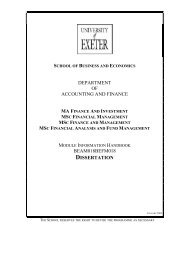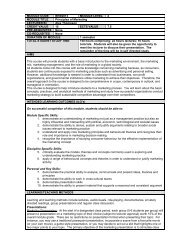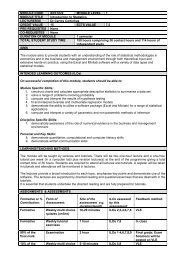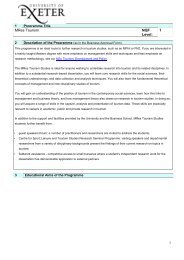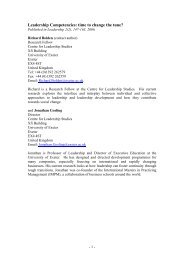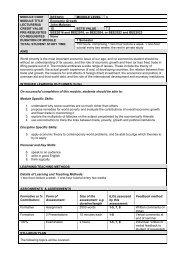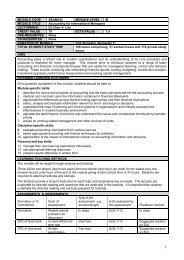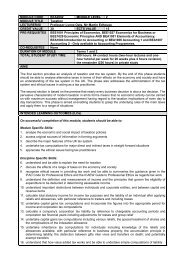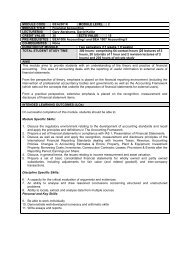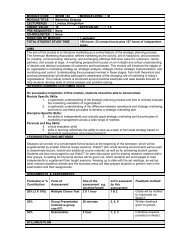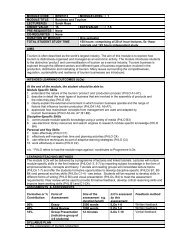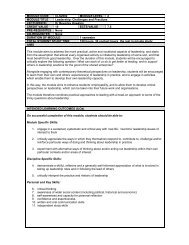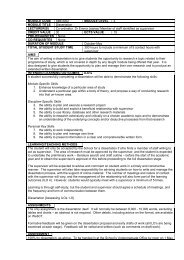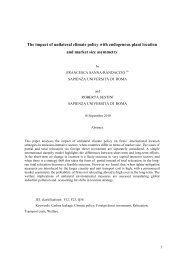MODULE CODE BEA3001 MODULE LEVEL 3 MODULE TITLE ...
MODULE CODE BEA3001 MODULE LEVEL 3 MODULE TITLE ...
MODULE CODE BEA3001 MODULE LEVEL 3 MODULE TITLE ...
You also want an ePaper? Increase the reach of your titles
YUMPU automatically turns print PDFs into web optimized ePapers that Google loves.
Working capital management<br />
Portfolio theory<br />
Asset pricing<br />
Market efficiency<br />
Options pricing<br />
Cost of capital<br />
Capital structure<br />
Dividend policy<br />
Corporate valuation<br />
Lease evaluation<br />
International aspects of financial management<br />
Mergers and acquisitions<br />
Balance sheet immunisation<br />
ILO4: Derive, criticise and challenge theoretical models for:<br />
Objective function of the firm<br />
Present value<br />
Working capital management<br />
Portfolio theory<br />
Complex covariance<br />
Capital asset pricing<br />
Value of an uncertain cash flow<br />
Capital asset pricing<br />
Option pricing via the Binomial method<br />
Put-call parity<br />
Value of the firm, cost of equity and weighted average cost of capital<br />
Value-relevance of dividend policy<br />
Balance sheet immunisation<br />
ILO5: Relate key financial issues one to another, to associated theory, to ‘real world’ evidence, and to the<br />
preferences and expectations of key stakeholders<br />
Core Academic Skills:<br />
ILO 6: (a) Develop powers of research in the academic literature and texts<br />
(b) Apply and criticise finance models in a ‘real world’ context<br />
(c) Develop powers of algebraic proof, derivation and criticism<br />
Personal and Key Skills<br />
ILO7: (a) Use information technology for information retrieval and numerical analysis<br />
(b) Build team skills in debating discussion topics and producing team solutions to problems<br />
(c) Build presentation skills in lecture / example class participation<br />
LEARNING/TEACHING METHODS<br />
Teaching and learning principally is organised into lectures, tutorial example classes and directed self-study. There<br />
are also regular surgery sessions to clear up student difficulties as they arise. Students are encouraged to work<br />
together in assimilating lecture material, preparing for tutorials and completing self-study assignments.<br />
All students are expected to attend all lectures and tutorials and complete all assigned work; and to attend surgery<br />
sessions as necessary. Much of the material will be covered by only one mode of delivery (lecture or tutorial or selfstudy).<br />
All material is potentially assessible, howsoever delivered.<br />
ASSIGNMENTS<br />
(Not for direct, summative assessment – see below for such)<br />
- Assigned work for each tutorial [ILOs 1, 2, 3, 4, 5, 6, 7]<br />
- Individual / group self-study assignments over the course of the two semesters [ILOs 1, 2, 3, 4, 5, 6, 7]<br />
ASSESSMENT<br />
- Two one-hour in-class multiple-choice tests (the first accounting for 5% module marks and the second for 15%<br />
module marks = 20% total) [ILO 3]



